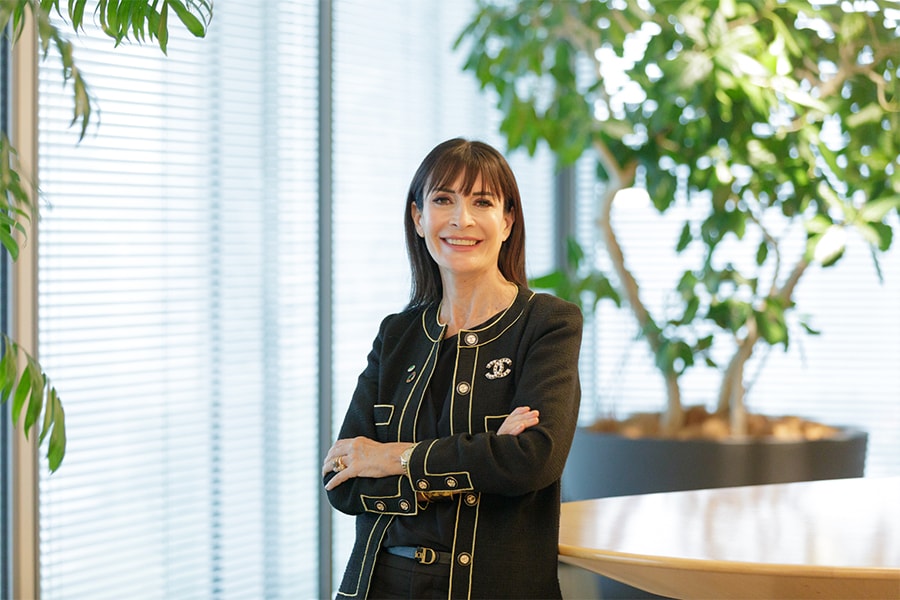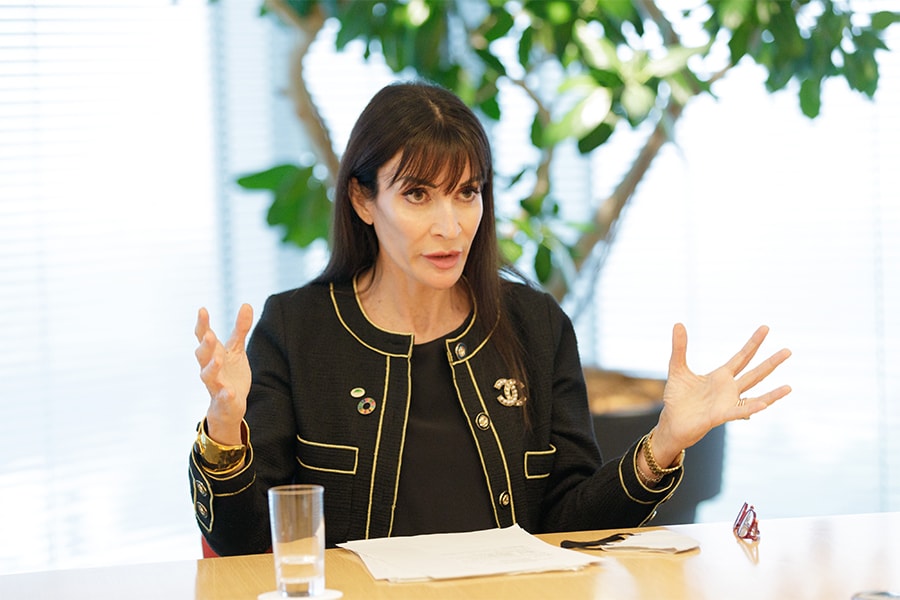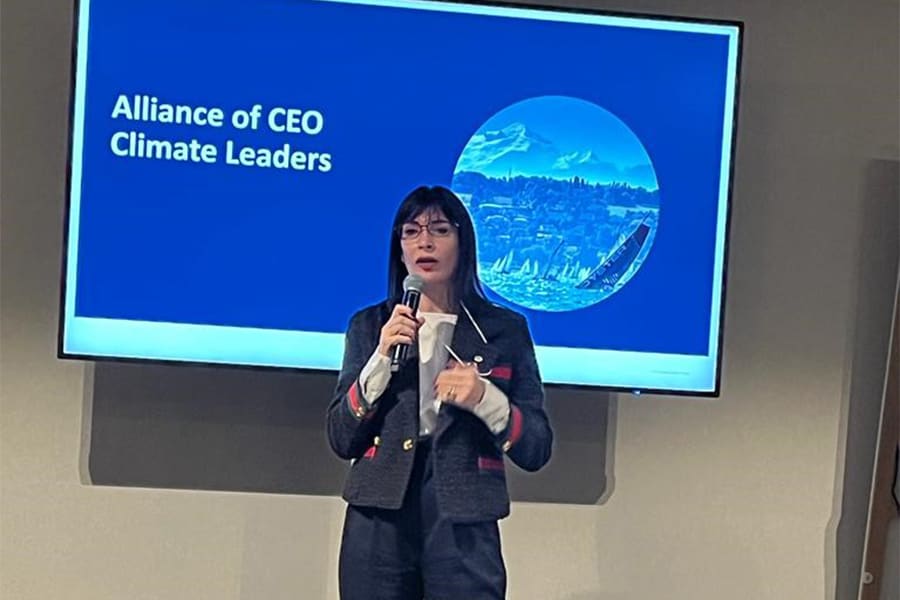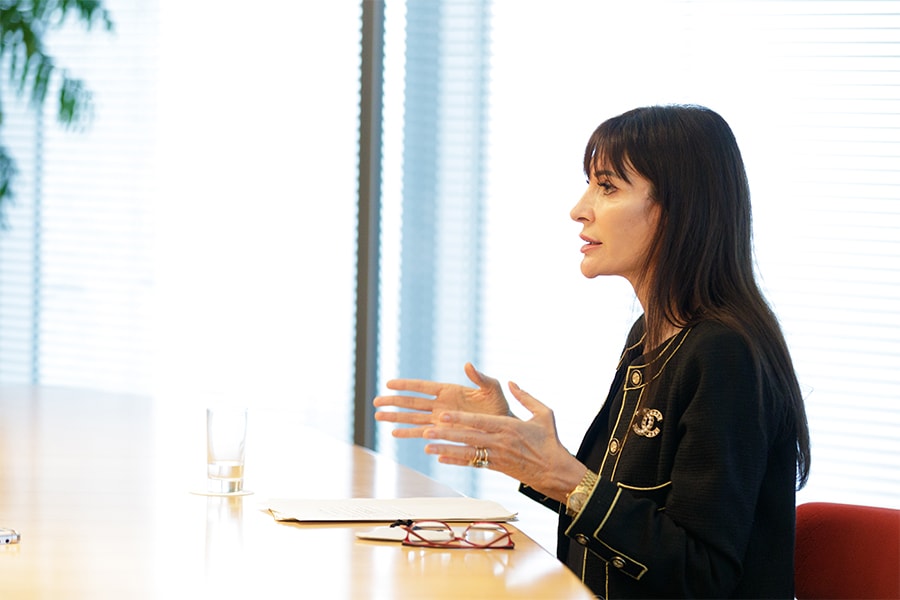Leading the Journey to Become a Climate Change Innovator: Hitachi’s Strategy for Green Transformation
Sep. 2, 2022
Eiko Hagiwara

In April 2022, Hitachi announced its new Mid-term Management Plan, in which “Green,” “Digital,” and “Innovation” were highlighted as 3 pillars of the company’s cross-group growth strategies. Here we present a series of interviews with executive officers in charge of each core strategy.
This article features the Green Strategy led by Ms. Lorena Dellagiovanna, Vice President and Executive Officer, Chief Sustainability Officer, Chief Diversity & Inclusion Officer and Head of Environment at Hitachi, Ltd. We asked Ms. Dellagiovanna about how Hitachi aims to achieve its environmental targets and her new role as Chief Sustainability Officer.
Solving environmental challenges through “GX”
-- Please tell us why Hitachi is focusing on “Green” in the 2024 Mid-term Management Plan, and what your responsibilities are as Head of the Global Environment Division.
Dellagiovanna: Looking at world macro trends, many countries have declared carbon neutrality targets as well as allocated investments, and the importance of protecting planetary boundaries has been recognized globally. Since its foundation, Hitachi has continuously committed to solving the issues faced by our customers and society, and now environmental issue is one of the biggest challenges faced across the globe.
As part of the mandate of my new role, I have the objective to accelerate the achievement of Hitachi’s environmental targets. We plan to enable our customers to contribute to the reduction of their CO2 emissions by 100 million tons per year by 2024 through the use of Hitachi products.
For Hitachi’s own operations, we aim to reach carbon neutrality for scope 1 and 2, and a 50% reduction through the entire value chain by 2030, compared with the base year of 2010. In the long term, we aim to reach carbon neutrality by 2050 for scope 1, 2, and 3*.
(Note)
*Scope 1 involves greenhouse gas emissions generated by an enterprise itself. Scope 2 involves emissions generated using electricity, thermal, steam, and other energy sources provided by other companies. Scope 3 involves emissions from other business activities. The emissions of the entire value chain are comprised of these three scopes.

-- How will you achieve those targets?
Dellagiovanna: Our Green Strategy is embedded in all of Hitachi’s business segments – mobility, energy, connective industries, and digital. In all these segments, we are working on developing various technologies which will significantly contribute to the acceleration of green transition.
Also, our strategy consists of two pillars: GX (Green Transformation) for CORE and GX for GROWTH. Let me explain further in details.
First, through our GX for CORE initiatives, we’ll strengthen our commitment to decarbonizing our own operations. We plan to invest in energy-saving and renewable energy generation projects and accelerate CO2 emissions reduction through value chain management, product redesign, and engagement with key customers.
On the other hand, GX for GROWTH initiatives will enable our customers to reduce CO2 emissions through our green-related services and products. For example, we will offer End-to-End service solutions through our battery and EV (Electric Vehicle) technologies and invest in future green technologies, including hydrogen energy storage and conversion of hydrogen into synthesized methane, an alternative to natural gas.
--What businesses are you specifically focusing on regarding GX for CORE and GX for GROWTH?
Dellagiovanna: In GX for CORE, we promote appropriate carbon neutrality measures aligned with the characteristics of each site. For instance, energy-intensive data center sites or small areas with multiple factories require efficient energy management, so we are now working to incorporate renewable energy at these sites and encouraging asset sharing as needed.
In GX for GROWTH, we will provide systems and technologies across many different sectors, including power transmission systems such as HVDC (High Voltage Direct Current) systems; new public transportation systems like battery-powered trams; EV motor and EV inverter technologies to accelerate the realization of the EV society; connective-industry technologies for energy savings in factory operations; and digital systems to visualize energy management.
Leading decarbonization as a Climate Change Innovator

--Promoting Green strategy has become one of the most pressing issues for companies and governments across the world. In light of such circumstances, what unique role do you think Hitachi should play in the global environmental effort?
Dellagiovanna: We take our responsibility very seriously as a global citizen to reduce our own carbon footprint, and we have set ambitious targets to become carbon neutral. As a Climate Change Innovator, I believe Hitachi needs to take more lead in decarbonization.
To achieve these ambitious targets, we will contribute to the understanding of our customers’ and society’s issues. With over 110 years of experience, we’re a unique technology company with deep expertise in operational technology, information technology, and products. With our green technology and digital capacity, we will innovate and co-create solutions with our customers, partners, and the global community to achieve a net-zero society.
“Let’s work together” to achieve carbon neutrality

--Aside from your responsibilities at Hitachi, is there something you do in your personal life that is good for the environment?
Dellagiovanna: As I love nature, I’m careful not to destroy it further. Here in Japan, people naturally respect the environment and can be very educated about nature conservation, including how to handle waste. Since I came to Japan from Italy in 2020, I have been learning more about the environment.
I’ve also loved sailing for many years. When sailing on a boat, you need to save water. If you use up all the water, you cannot cook, brush your teeth, or do anything on the boat. This is one way I learned how to conserve natural resources. I hope to bring my experience and inspire people around me with my behavior.
--Finally, could you share your enthusiasm for achieving carbon neutrality by 2050?
Dellagiovanna: Climate change is a challenge that requires a global and united approach. We need to operate as One Hitachi more than ever, and the solid foundation that sustains this ambitious initiative is the commitment of all Hitachi employees.
It’s also essential that we work in partnership. In addition to our employees, the external stakeholders – all our customers, suppliers, the academia, and policymakers – must be involved. That’s the only way we can achieve a net-zero society. So, let’s join hands together. Stop talking and take action. I’d love to invite every employee and external partner to work with us to realize carbon neutrality.



